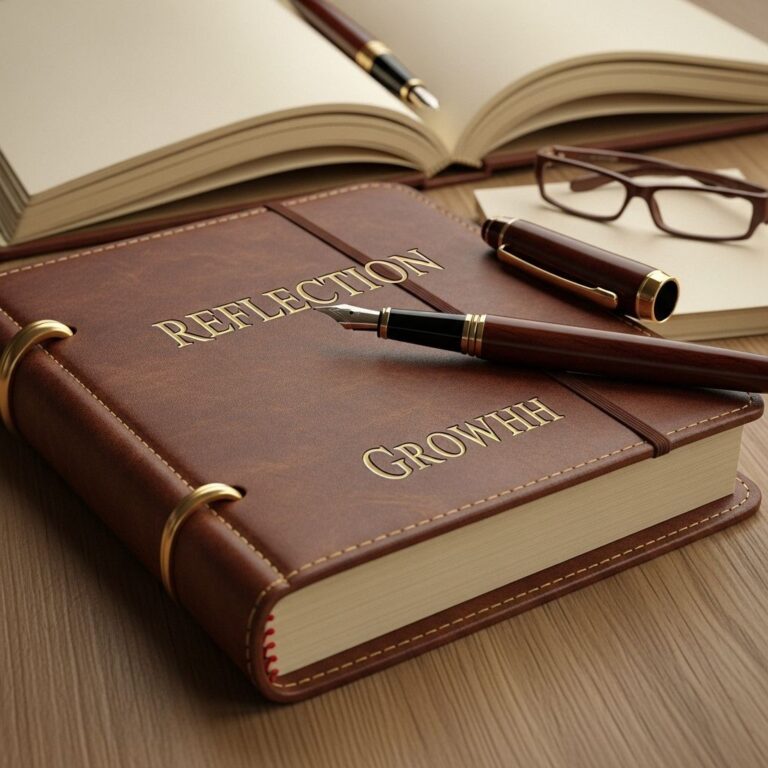In a fast-paced world where every moment counts, the practice of daily reflection has emerged as a powerful tool for personal and professional growth. By taking the time to pause and assess our actions, thoughts, and feelings, we can gain invaluable insights that pave the way for future success. This article delves into the profound benefits of daily reflection, techniques to incorporate it into your routine, and its impact on achieving long-term goals.
Table of Contents
The Power of Daily Reflection
Daily reflection allows us to step back from our daily hustle and evaluate our experiences. This practice can lead to greater self-awareness, improved decision-making, and enhanced emotional intelligence.
Benefits of Taking Time to Reflect
- Enhanced Self-Awareness: Understanding your strengths, weaknesses, and triggers leads to better personal and professional relationships.
- Improved Decision-Making: Reflecting on past choices helps in making informed future decisions.
- Stress Reduction: Acknowledging emotions and experiences diminishes anxiety and promotes mental well-being.
- Goal Reassessment: Regular reflection helps in evaluating progress towards goals and adjusting strategies as necessary.
- Learning from Mistakes: Reflection allows for a deeper understanding of failures and how to avoid repeating them.
Incorporating Daily Reflection into Your Routine
Making daily reflection a habit requires intention and consistency. Here are several strategies to help you integrate this practice into your everyday life.
1. Set Aside Time
Designate a specific time each day for reflection. This can be in the morning, during lunch, or before bed. Consistency helps establish a habit.
2. Create a Comfortable Environment
Your surroundings can significantly impact your ability to reflect. Choose a quiet, comfortable space free of distractions.
3. Use Reflective Journals
Journaling can be an effective way to document your reflections. Consider the following aspects when journaling:
- What went well today?
- What challenges did I face?
- What did I learn?
- What am I grateful for?
- How can I improve tomorrow?
4. Employ Mindfulness Techniques
Mindfulness practices, such as meditation or deep breathing exercises, can enhance your reflective process by helping you stay present and focused.
5. Discuss Your Reflections
Engaging in conversations about your reflections with friends or mentors can provide new perspectives and insights.
Tools and Techniques for Effective Reflection
Utilizing the right tools can enhance your daily reflection practice. Here are some recommended techniques and tools:
| Tool | Description | Purpose |
|---|---|---|
| Journals | Physical or digital notebooks for recording thoughts and experiences. | Document experiences and track progress. |
| Apps | Applications like Day One, Reflectly, or Journey that guide you through reflective practices. | Easy recording and prompt reflection. |
| Podcasts | Shows focused on self-improvement and reflection. | Gain insights and inspiration from others. |
| Workshops | Interactive sessions focused on reflection and goal-setting. | Learn techniques from professionals. |
The Impact of Daily Reflection on Long-Term Success
While daily reflection is powerful, its true impact is best seen over time. Those who engage in regular reflection often notice profound changes in their professional and personal lives.
Achieving Professional Goals
Professionals who take time to reflect on their work often see improvements in their productivity and job satisfaction. Here’s how:
- They adapt their strategies based on what works and what doesn’t.
- They build stronger relationships with colleagues and clients through enhanced self-awareness.
- They are more open to feedback and willing to learn.
Personal Growth and Development
On a personal level, daily reflection can lead to greater fulfillment and happiness:
- Individuals develop a clearer sense of purpose and direction in life.
- They cultivate resilience by learning from hardships.
- They prioritize self-care and mental well-being.
Potential Challenges and How to Overcome Them
Incorporating daily reflection into your routine can come with challenges. Below are some common obstacles and ways to overcome them:
1. Lack of Time
Many claim they don’t have time for reflection. Combat this by:
- Starting small with just 5-10 minutes.
- Incorporating reflection into existing routines, like during commutes or while exercising.
2. Difficulty in Expressing Thoughts
If articulating thoughts is tough, try:
- Using prompts to guide your reflection.
- Recording voice memos to capture your feelings.
3. Inconsistent Practice
Staying consistent can be tricky. To help:
- Set reminders on your phone or calendar.
- Pair reflection time with another daily habit, like drinking morning coffee.
Conclusion
Daily reflection is more than just a practice; it’s a pathway to understanding oneself and making meaningful changes in life. By regularly assessing our thoughts and actions, we not only enhance our decision-making and emotional intelligence but also set ourselves up for long-term success. Start today and witness the transformative power of reflection in your personal and professional life.
FAQ
What is daily reflection and why is it important for success?
Daily reflection is the practice of taking time each day to think about your experiences, decisions, and actions. It is important for success as it helps you identify strengths, areas for improvement, and promotes continuous learning.
How can I incorporate daily reflection into my routine?
To incorporate daily reflection into your routine, set aside 10-15 minutes at the end of each day to journal your thoughts, review your goals, and assess your progress. You can also use prompts to guide your reflections.
What are some effective techniques for daily reflection?
Effective techniques for daily reflection include journaling, meditation, mindfulness exercises, and using reflection prompts or questions to stimulate thought and insight.
How does daily reflection contribute to personal growth?
Daily reflection contributes to personal growth by encouraging self-awareness, enhancing decision-making skills, and fostering a deeper understanding of your values and goals.
Can daily reflection improve my productivity?
Yes, daily reflection can improve productivity by helping you prioritize tasks, identify distractions, and develop strategies to overcome challenges, ultimately leading to more focused and efficient work.
What are some common mistakes to avoid when practicing daily reflection?
Common mistakes to avoid when practicing daily reflection include being too critical of yourself, failing to set a consistent time for reflection, and not being honest or thorough in your evaluations.









